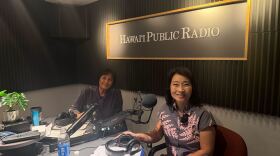-
The Kona Community Hospital on Hawaiʻi Island is putting the finishing touches on a new on-site oncology center, which hospital leadership hopes will better meet the needs of nearby cancer patients.
-
The Conversation sat down with Queen's CEO Jason Chang to better understand the dynamics of the proposed HMSA-HPH partnership — and why he’s resisting it.
-
Lt. Gov. Sylvia Luke talks about a federally funded effort to boost internet connectivity across the islands; Queen's Health Systems CEO Jason Chang shares his concerns about the proposed merger between HMSA and Hawaiʻi Pacific Health
-
About 250 health care workers at Kaiser Permanente in Hawaiʻi have begun an unfair labor practice strike over contract negotiations. Kaiser confirmed Monday that both sides have agreed to resume discussions.
-
Gov. Josh Green delivers his State of the State address; Oʻahu residents gathered to protest over the weekend in response to the second killing of a U.S. citizen by federal agents in Minnesota
-
The United Nurses Associations of California/Union of Health Care Professionals (UNAC/UHCP) sent Kaiser its 10-day strike notice stating that a strike may start on Monday.
-
Gov. Josh Green spoke to HPR's DW Gibson about immigration, health care and affordability ahead of the Hawaiʻi State Legislature's opening day next Wednesday.
-
Gov. Josh Green talks about immigration and rising health care premiums; Musician Clara Kim kicks off the new music series "Noise Cabinet" at Capitol Modern
-
State lawmakers will face the federal impacts on the state’s health care systems and social services when they reconvene next Wednesday. HPR's Ashley Mizuo reports on some of the main policies being considered.
-
The joint briefing Tuesday included the state’s other health insurance and health care providers. Many raised concerns about how the partnership would impact competitive markets, access to care, and client balances at health systems.
Play Live Radio
Next Up:
0:00
0:00
Available On Air Stations









